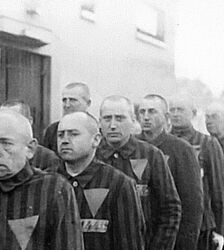Music
Musical works of diverse origin and style were performed and composed during the Nazi period. The Nazi Party itself made widespread use of music at rallies and public events, particularly marching music and rousing propaganda songs. In many of the ghettos and camps that were established across Nazi-occupied Europe between 1933 and 1945, prisoners created and performed a wide range of new and existing music, particularly songs. Jewish inmates in the ghettos often wrote new Yiddish songs based on well-known melodies.

Religious Music
Religious Music
2 Articoli

Songs
Songs
86 Articoli
Highlighted Composition
Nome
Artista
Categoria
Durata
Sur l'aile de la liberté
Par les cités et les compagnes.
Nos pas, nos coeurs sont emportés
Au loin de nos cheres compagnes,
Mais on les reverra,
L'heure H arrivera
Car nous sauvons la France
Nous les amis, nous les amis,
Car nous sauvons la France
Nous les amis
Du maquis.
On the wings of Freedom
By the cities and the countryside
Our feet, our hearts are carried
Far away by our dear friends
But we see them again
Zero hour arrives
Because we are saving France
Us friends
of the Maquis.
Au jardin d’Angleterre, les bobards ont fleuri.
Tous les menteurs du monde parlent à la BBC.
Au gre de ces ondes, qu’il fait bon mentir
In the garden of England, deception has flourished.
All the liars of the world speak on the BBC.
As the radio waves welcome it, they tell good lies.
Evgeny Evtushenko (1962)

Lyrics
1940.
On my birthday
The Germans walked-walked into Holland
Germans invaded Hungary
I was in 2nd grade
I had a teacher
A very tall man, his head was completely plastered smooth
He said, "Black Crows-
Black Crows invaded our country many years ago"
And he pointed right at me
No more school
You must go away
And she said, "Quick, go!"
And he said, "Don't breathe"
Into the cattle wagons
And for four days and four nights
And then we went through…
The idea for the piece comes from my childhood. [Due to my parent’s divorce], I travelled back and forth by train frequently between New York and Los Angeles from 1939 to 1942. […] While these trips were exciting and romantic at the time, I now look back and think that, if I had been in Europe during this period, as a Jew I would have had to ride on very different trains. With this in mind, I wanted to make a piece that would accurately reflect the whole situation.
Jüdische Chronik ♫ - Excerpt from the CD Jüdische Chronik, courtesy of Edel Classics (www.edel.com).

(1947)
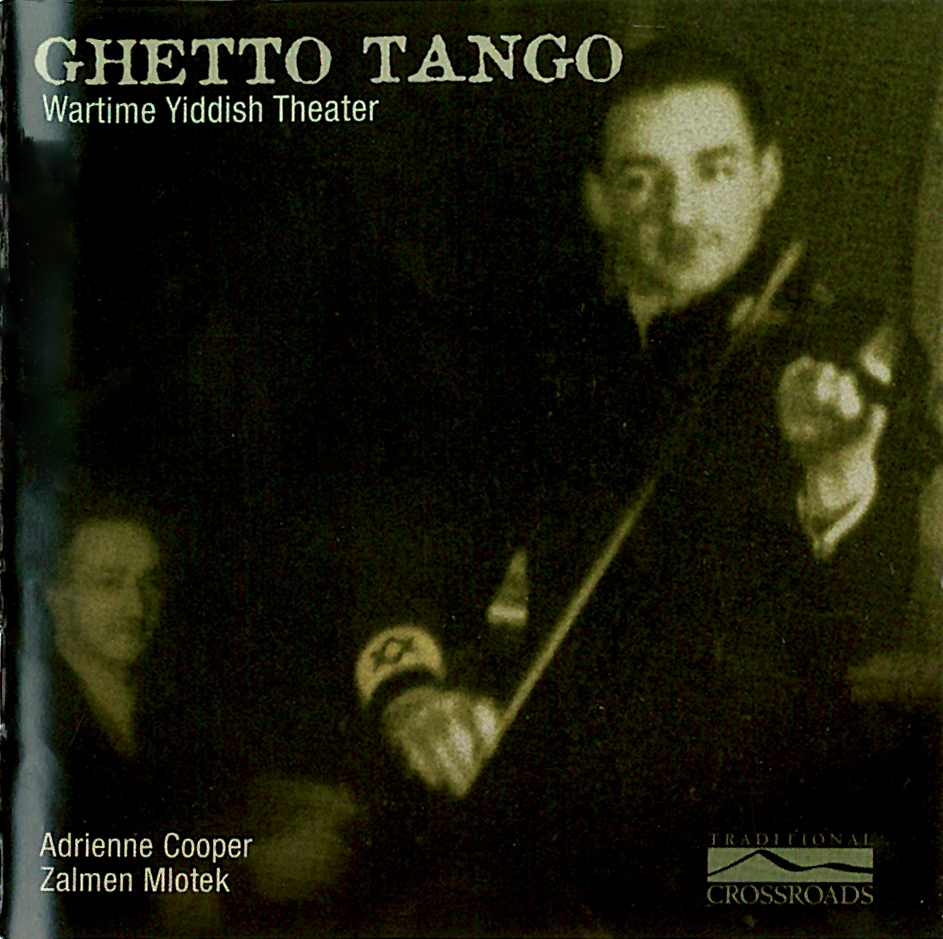
Moes, moes is courtesy of Traditional Crossroads (www.traditionalcrossroads.com).
Recorded: Kampo, New York, USA
ISBN: CD 4297
Accession Number: CD213
Singing is Adrienne Cooper accompanied by Zalmen Mlotek playing Piano.

Courtesy of Traditional Crossroads (www.traditionalcrossroads.com).
Recorded: Kampo, New York, USA
ISBN: CD 4297
Accession Number: CD213
Singing is Adrienne Cooper accompanied by Zalmen Mlotek playing Piano.
Yid, du partizaner ♫ - "Yid, du partizaner" taken from the CD Ghetto Tango - Wartime Yiddish Theater
Adrienne Cooper, Zalmen Mlotek (2000)

Yid, du partizaner is courtesy of Traditional Crossroads (www.traditionalcrossroads.com).
Recorded: Kampo, New York, USA
ISBN: CD 4297
Singing is Adrienne Cooper accompanied by Zalmen Mlotek playing Piano.
Original Yiddish
Oyfn pripetshik brent a fayerl,
Un in shtub iz heys,
Un der rebe lernt kleyne kinderlekh,
Dem alef-beys.
Zet zhe kinderlekh, gedenkt zhe, tayere,
Vos ir lernt do;
Zogt zhe nokh a mol un take nokh a mol:
Komets-alef: o!
Lernt, kinder, mit groys kheyshek,
Azoy zog ikh aykh on;
Ver s’vet gikher fun aykh kenen ivre –
Der bakumt a fon.
Lernt, kinder, hot nit moyre,
Yeder onheyb iz shver;
Gliklekh der vos hot gelernt toyre,
Tsi darf der mentsh nokh mer?
Ir vet, kinder, elter vern,
Vet ir aleyn farshteyn,
Vifl in di oysyes lign trern,
Un vi fil geveyn
Az ir vet, kinder, dem goles shlepn,
Oysgemutshet zayn,
Zolt ir fun di oysyes koyekh shepn,
Kukt in zey arayn!
English Translation by Translation by Professor David Shneer, University of Colorado—Boulder, December 5, 2019
On the stove, a fire burns,
And in the house it is warm.
And the rabbi is teaching little children,
The alphabet.
See, children, remember, dear ones,
What you learn here;
Repeat and repeat yet again,
“Komets-alef: o!”
Learn, children, with great enthusiasm.
So I instruct you;
He among you who learns Hebrew pronunciation faster
He will receive a flag.
Learn children, don’t be afraid,
Every beginning is hard;
Lucky is the one has learned Torah,
What more does a person need?
When you grow older, children,
You will understand by yourselves,
How many tears lie in these letters,
And how much lament
When you, children, will bear the Exile,
And will be exhausted,
May you derive strength from these letters,
Look in at them!
Dialogue from Schindler's List (1993)
'Heveti shalom aleykhem' (I bring you greetings of peace), also often titled in the plural, is one of the best-known and -loved Hebrew folk songs. In this rare recording it is sung by surviving Polish children in postwar France, in a recording taken by the Latvian-American psychologist David Boder in September 1946.

Benzion Moskovits
In 1942 Cantor Benzion Moskovitsh (1907-1968) was deported to Westerbork and in 1944 to Buchenwald. There he sang for fellow prisoners and took notes of melodies he heard on a smuggled block-note.

Yehoshua Wieder
Cantor Yehoshua Wieder and his family were deported to Auschwitz, where his wife Chana and three youngest children were killed. Wieder and his three other children survived.

Charles Lowy
Cantor Charles Lowy (1911-1998) escaped Munich after Kristallnacht to Hungary and became chief cantor in Szolnok. From 1942 he was subjected to forced labour and liberated by the Red Army in 1945. His wife and son were killed in Auschwitz.

Henech Kon
Composer Henech Kon (1890-1970) moved to New York before WWII, where he was one of the immigrant writers and artists who had fled Nazism. He continued to compose pieces commemorating the destruction of Polish Jewry.
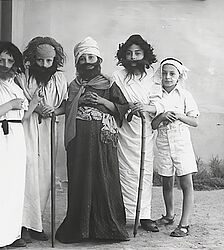
Yonas Turkov
Jonas Turkow (1898-1987) was an actor, stage manager, director and writer. He received the Itzik Manger Prize for his contributions to Yiddish letters.

Diana Blumenfeld
Diana Blumenfeld (1903–1961) was a folksinger, pianist, and actress. Caught in the ghetto along with her husband, family and friends, she continued to sing, performing in cafes and in the ghetto theatre.

Martin Rosenberg
In 1933, Rosebury D’Arguto’s activities with his Gesangsgemeinschaft was banned. On a return trip to Germany to settle some personal matters in September 1939, he was arrested by the Gestapo, and taken to Sachsenhausen where he organized a Jewish choir.

Kurt Gerron
A cabaret artist, theatre and film actor and director of theatre and early sound movies, Kurt Gerron (1897-1944) was a successful entertainer of the 1920s and early 1930s. He directed the Terezin propaganda film and was killed soon after.
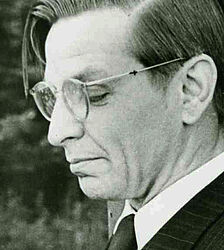
Wolfgang Langhoff
Actor, director and leftist activist Wolfgang Langhoff (1901-1966) engaged in cultural activities in Börgemoor, organising the ‘Zirkus Konzentrazani’, as well as co-creating the song ‘Moorsoldatenlied’.

Erich Hugo Frost
Composer and musician Erich Hugo Frost (1900-1987) was imprisoned several times in prisons and concentration camps between 1934 and 1945. He composed ‘Fest steht in großer, schwerer Zeit (Stand Fast in Great and Hard Times) in the spring of 1941.

Alfred Rosenberg
Alfred Rosenberg (1893-1946) wrote Der Mythus des 20. Jahrhunderts (The Myth of the 20th Century) in 1934, which argued for the supremacy of the 'Aryan' race and the threat posed by Jews. He was found guilty of crimes against humanity and executed.
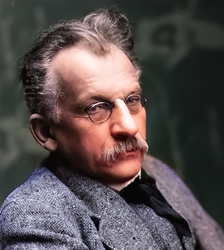
Hans Pfitzner
The composer Hans Pfitzner (1869-1949) saw himself as a defender of the German nation, its values, and its culture against a ‘degenerate’ and ‘corrupt’ France. During his denazification trial, along with Furtwängler, Egk and Strauss, he was found not guilty.
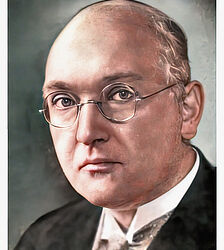
Hans Joachim Moser
Hans Joachim Moser (1889-1967) blamed America and the Jews for commercialising music. His commitment to celebrating Germany won him Nazi approval and was promoted to general secretary of the Ministry of Propaganda.

Bruno Walter
By 1898 Bruno Walter Schlesinger (1879-1962) was a musical theatre director and a few years later director of the Bavarian state opera. Blacklisted by the Nazis, he left for the US in 1938 where he conducted the New York Philharmonic.

Kurt Weill
Like few others, Kurt Weill (1900-1950) and Bertolt Brecht (1898-1956) are synonymous with the cultural innovation of the Weimar Republic. Most famously with their Die Dreigroschenoper, the duo represented everything that the Nazis declared its enemy.
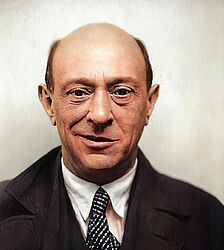
Arnold Schoenberg
Composer Arnold Schönberg (1874-1951) together with Berg and Webern, are known as the Second Viennese School. His revolutionary musical technique of dodecaphony (twelve tones) was his signature creation.

Viktor Ullmann
Composer Viktor Ullmann (1898-1944) grew up and was educated in Vienna. He was trapped in Prague on the German invasion in March 1939 after trying unsuccessfully to find work in London or South Africa. In 1942 he was deported to Terezin.

Carlo Taube
In December 1941, pianist, composer and conductor Carlo Sigmund Taube (1897-1944) was deported to Theresienstadt with his wife and child.
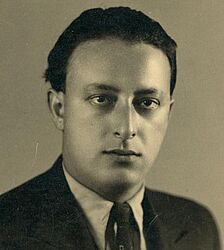
Rafael Schächter
Rafael Schächter (1905-1944) made his name as an accompanist and vocal coach, working in opera and theatre before deportation to Terezin in Nov 1941. A pioneer of cultural life in the ghetto, he was deported to Auschwitz on 16 Oct 1944.

Karel Berman
Bass singer Karel Berman (1919-1995) was deported to Terezin on 6 Mar 1943. He sang in operas and recitals and was cast as 'Death' in Ullmann’s Der Kaiser von Atlantis. Transported to Auschwitz on 28 Sep 1944 and liberated from the Allach camp.
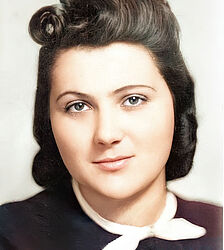
Marysia Ayznshtat
Marysia Ayznshtat (1921–1942) was one of the best-loved musical figures of the Warsaw ghetto. She was shot dead by an SS officer aged twenty-one.

Khayele Rozental
Khayele Rozental (1924-1979) was one of the most popular singers in the Vilna ghetto. She established her talents in drama and singing aged 16, when she was chosen to represent Vilna at the Festival of Songs in Moscow.

Yankl Trupyanski
Yankl Trupyanski was (1909-1944) a music teacher and composer of children's songs in Warsaw and Vilna. He composed many of the songs sung by children in the Yiddish schools of the inter-war years.

Zofia Czajkowska
The Polish music teacher Zofia Czajkowska arrived in Auschwitz on 27 April 1942 on a transport from her home town of Tarnow. She was to become the original organiser and first conductor of the Birkenau women’s orchestra.

Hans Neumeyer
From the age of fourteen, Hans Neumeyer (1887-1944), a composer and teacher of musical composition, was completely blind. He died whilst interned in Theresienstadt on 19 May 1944.

James Simon
In spring 1944, composer, pianist and musicologist James Simon (1880-1944) was sent to Westerbork. On April 4 he was deported with 1000 other inmates to Terezín. On 12 October 1944 he boarded the transport to Auschwitz.

Zikmund Schul
The composer and violinist Zikmund Schul (1916-1944) and his father left Germany in October 1933, taking residence in Prague. He was transported to Terezín on 11 November 1941 where he continued to compose pieces, few of which survive.

Egon Ledeč
Egon Ledeč (1889-1944) was a Czech violinist and composer sent to Theresienstadt. He appears as the concertmaster in Karel Ančerl’s orchestra in the Nazi propaganda film of the camp.

Wladyslaw Szlengel
Władysław Szlengel (1912-1943) was a Jewish-Polish poet, lyricist, journalist, and stage actor. He was shot along with his wife at the age of 28.

Avraham Sutzkever
Avraham Sutzkever (1913-2010) is one of the most important contemporary Yiddish poets. During the war, Sutzkever was involved in many acts of resistance and helped save many important texts. He escaped to Moscow with his wife.
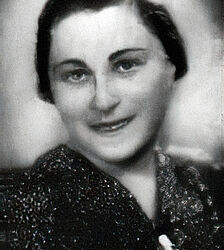
Leah Rudnitski
Leah Rudnitski (1916-1943) wrote one of the most beautiful lullabies to have survived the Vilna ghetto, entitled ‘Dremlen feygl oyf di tsvaygn’ (Birds doze on the boughs). She was arrested by the Gestapo and sent to Treblinka, where she was murdered.
















